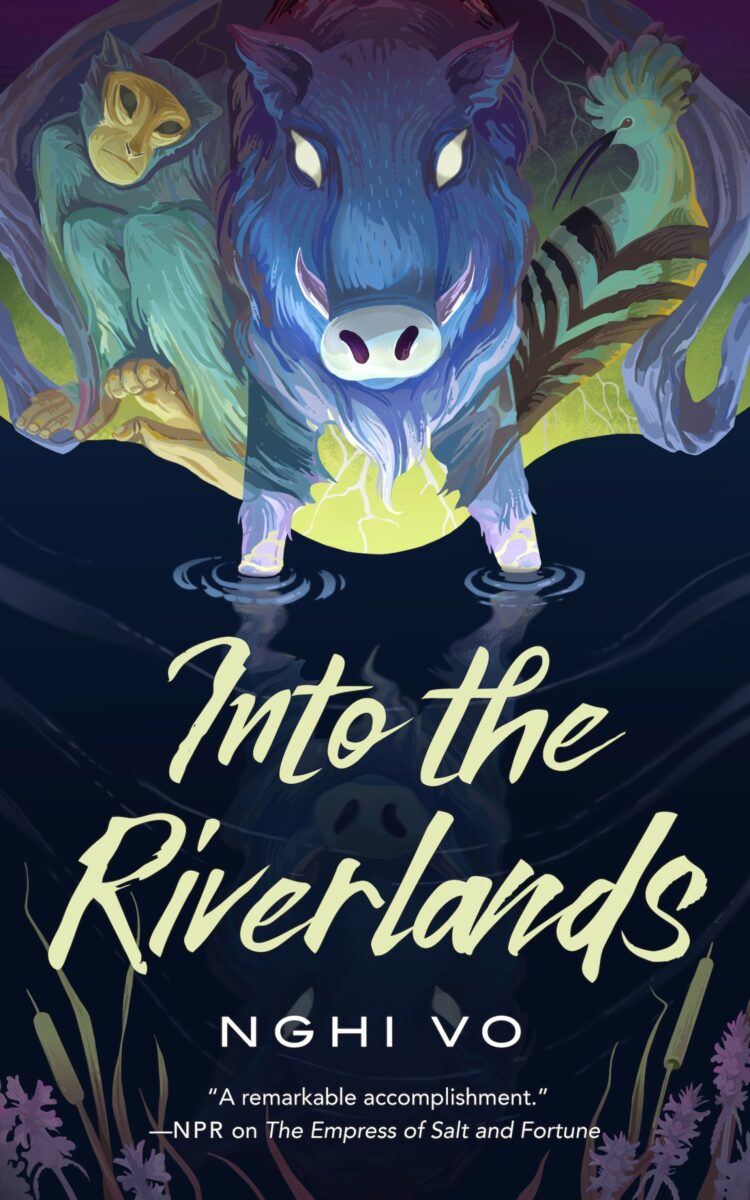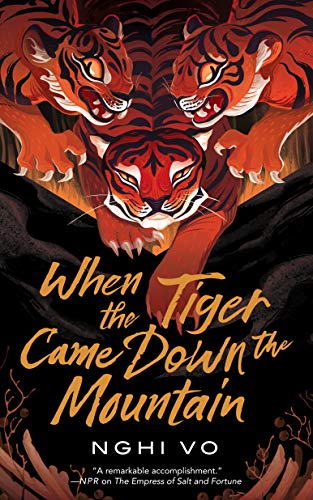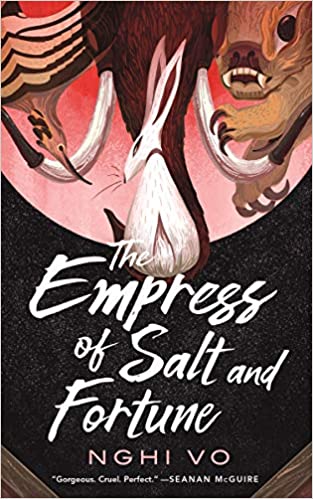Those familiar with the Singing Hills Cycle know by now to expect marvelous little novellas like perfectly cut jewels, dense with facets and brilliance. Into the Riverlands, Nghi Vo’s third installment, is of course no different. Following the further adventures of story-collecting historian monk Chih and their eidetically-inclined avian companion Almost Brilliant, this book takes us into the wilds of a politically-contested region called the riverlands. Chih gains some temporary traveling companions, and just in time, too, because the riverlands can be treacherous.

Vo infuses Into the Riverlands with wuxia tropes to give additional dimensions to her story, so of course it starts in a teahouse. Well, actually it starts in a barber shop with Chih getting their head shaved, to remind us that they are (nominally) a monk and, more importantly, that this is not just a story about the action.
I want to note, though, that the action is very fun. A beautiful young woman in silk robes with impeccable posture chastising brutes three times her size! A bickering married pair flirting between battles! The characters are perfectly realized, people with one foot in legend and the other in the everyday. And their stories, told over the course of a very short journey into the titular riverlands, help us to see that the dichotomy between legend and living person is a false one. Nobody in Into the Riverlands is just one thing, or even two things. Complexity is the point.
The way Vo treats the villainous Hollow Hand—or rather, a group of evil-minded idiots imitating a long-scattered gang called the Hollow Hand—is just really smart. (And topical, but let’s not get into that.) So often we see the good/evil dichotomy played out with either good and evil evenly matched, or with evil as some overwhelming force, against which only a determined band of underdogs have any chance of winning. Instead, Into the Riverlands features a cadre of evildoers who are as dumb as they are mean, nothing more than a pack of bullies imitating the bad guys they know from old stories, having learned all the wrong lessons from history. (See? Topical.) But bullies can still do a lot of harm, and Vo doesn’t let us forget that. From the first pages, Chih and their companions must not just defeat the bullies, but also deal with the far less glamorous work of cleaning up their messes. Whether paying for damages or doing the heavy work of giving last respects to a corpse, Vo makes sure we know that the good guys are really just the people who do their best to pick up the pieces.

Of course, the “good guys” here are mostly good in relational terms, not absolute ones. Wei Jintai, Mac Sang, and the others aren’t perfect, and neither, for that matter, are Chih and Almost Brilliant. They’re just people doing their best, and sometimes that “best” is a matter of context. We eventually learn that the effervescent Wei Jintai, so instinctively noble and protective, has left behind a cloud of rumors; her physical prowess was not necessarily so helpful in the past. And Lao Bingyi and Khanh—well. Suffice to say that they know very well that the truth and the telling are two different things.
The telling—and the tellers. Chih is no warrior, and neither is Sang, so their take on events is tinged with an awe that the warriors themselves do not feel. Chih and Sang likewise downplay their own roles as they very sensibly avoid battle and find other ways to help, while Almost Brilliant stays out of it entirely, fleeing to the branches or rafters and keeping uncharacteristically quiet.

In the same way it’s very easy to set up a good/evil duality, it’s also easy to fall into the trap of casting martial characters as brave and all others as cowardly, naïve, or just plain useless. Vo doesn’t let that happen. Chih has an important role to play, as does Sang, and Almost Brilliant might have the most crucial role of all. By fleeing far enough to be safe but close enough to observe, Almost Brilliant becomes—not a coward—but a witness. She can attest to the true narrative—or provide a counternarrative, should the other side win the day. She can also ensure that the stories of the people she loves and admires will continue on even if their lives are extinguished.
Or—some of their stories, from some perspectives. That’s the tricky thing, Vo never stops reminding us (gently!). But she doesn’t belabor the question of subjective truth too much, for which I’m grateful. This is a story about stories, not about philosophy, and it relies on a certain comfort with ambiguity instead of endless argument. Chih is certainly not there to pass judgment. And while their philosophy is well taken, I will say that my own judgment is quite clear: buy this book, because you’ll want to revisit these particular stories again and again.
